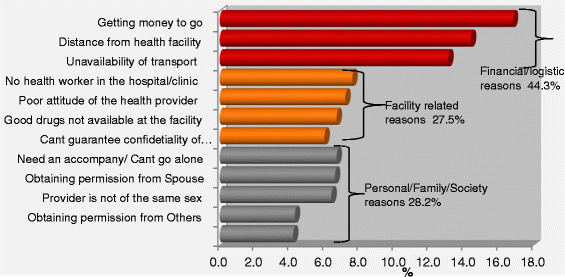Barriers to antenatal care use in Nigeria: evidences from non-users and implications for maternal health programming
- PMID: 25885481
- PMCID: PMC4407543
- DOI: 10.1186/s12884-015-0527-y
Barriers to antenatal care use in Nigeria: evidences from non-users and implications for maternal health programming
Abstract
Background: In Nigeria, over one third of pregnant women do not attend Antenatal Care (ANC) service during pregnancy. This study evaluated barriers to the use of ANC services in Nigeria from the perspective of non-users.
Methods: Records of the 2199 (34.9%) respondents who did not use ANC among the 6299 women of childbearing age who had at least one child within five years preceding the 2012 National HIV/AIDS and Reproductive Health Survey (NARHS Plus II), were used for this analysis. The barriers reported for not visiting any ANC provider were assessed vis-à-vis respondents' social demographic characteristics, using multiple response data analysis techniques and Pearson chi-square test at 5% significance level.
Results: Of the mothers who did not use ANC during five years preceding the survey, rural dwellers were the majority (82.5%) and 57.3% had no formal education. Most non-users (96.5%) were employed while 93.0% were currently married. North East with 51.5% was the geographical zone with highest number of non-users compared with 14.3% from the South East. Some respondents with higher education (2.0%) and also in the wealthiest quintiles (4.2%) did not use ANC. The reasons for non-use of ANC varied significantly with respondents' wealth status, educational attainment, residence, geographical locations, age and marital status. Over half (56.4%) of the non-users reported having a problem with getting money to use ANC services while 44.1% claimed they did not attend ANC due to unavailability of transport facilities. The three leading problems: "getting money to go", "Farness of ANC service providers" and "unavailability of transport" constituted 44.3% of all barriers. Elimination of these three problems could increase ANC coverage in Nigeria by over 15%.
Conclusion: Non-use of ANC was commonest among the poor, rural, currently married, less educated respondents from Northern Nigeria especially the North East zone. Affordability, availability and accessibility of ANC providers are the hurdles to ANC utilization in Nigeria. Addressing financial and other barriers to ANC use, quality improvement of ANC services to increase women's satisfaction and utilization and ensuring maximal contacts among women, society, and ANC providers are surest ways to increasing ANC coverage in Nigeria.
Figures
References
-
- Federal Ministry of Health N (FMoH) National HIV/AIDS and Reproductive Health and Serological Survey, 2012 (NARHS Plus) Abuja, Nigeria: Federal Ministry of Health; 2013.
-
- Lincetto O, Mothebesoane-anoh S, Gomez P, Munjanja S. Antenatal Care: Opportunities for Africa’s Newborns. 2010.
-
- National Population Commission (Nigeria) and ICF International: Nigeria Demographic and Health Survey 2013. Abuja, Nigeria; 2014.
MeSH terms
LinkOut - more resources
Full Text Sources
Other Literature Sources
Medical



